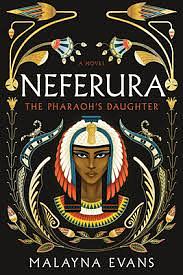You need to sign in or sign up before continuing.
Take a photo of a barcode or cover
Secret Society of Women in Egypt. Political intrigue of court and Pharos lives. All in easy to read modern English historical fiction.
mysterious
tense
slow-paced
Plot or Character Driven:
A mix
Strong character development:
No
Loveable characters:
No
Diverse cast of characters:
Yes
Flaws of characters a main focus:
Complicated
My first DNF book of 2024, and it has nothing to do with the book's subject. I'm a huge Ancient Egypt fan and I loved the idea of a story focused on women's power and featuring the daughter of one of the very few female pharaohs. But it really failed in execution. Malayna has clearly done her research and knows a lot about the history and the time period. But it feels anachronistic in a way that's really hard to place. I think it has something to do with the characters, who feel like a variety of modern people who just happen to live in a world that looks like Ancient Egypt. Modern values and opinions seem plastered over the trappings of the time period. Though it's definitely not a YA book, stylistically it seems closer to something written for the younger teens. It also feels unpolished, like either the writer is either fairly young or this is one of their earliest forays into fiction. The characters are unremarkable and don't seem to have any real goals or desires. Supposedly they have relationships to each other, but there's never a sense that our titular protagonist actually cares about any of them. I think Neferura's emotions were the most confusing thing about her, because they never seemed to fit what a normal person would feel. Simple, inane things leave her struggling not to cry from sheer frustration; her mother's casual cruelty doesn't seem to even register. I feel like a real pharaoh's daughter would not make it to adulthood being as naïve and gullible as she is - she'd either get wise or be chewed up by the allegedly-ruthless court. And don't even get me started on the body-shaming and fat-shaming in this book. The very first line is Neferura getting body-shamed by her mother. In the first twenty-four pages, she is fat-shamed by her mother twice, by her own narration three or four times, and she fat-shames her mother once. It's excessive and entirely unnecessary to anything in the story. So on the whole, while I think the concept is interesting and I would definitely be open to a book exploring Ancient Egypt with Nefertiti's daughter, this book does not do that idea justice.
Graphic: Body shaming, Fatphobia
Minor: Emotional abuse, Incest, Death of parent
this was an ARC that I had but did not get engaged before it published, so just washing it as a loss atm, maybe I'll come back to it if I come across it in the wild - there was nothing wrong with it I just was not able to get interested. Thank you netgalley and sourcebooks landmark for the e-copy
dark
emotional
tense
medium-paced
Plot or Character Driven:
Plot
Strong character development:
Complicated
Loveable characters:
Complicated
Diverse cast of characters:
Yes
Flaws of characters a main focus:
Yes
adventurous
mysterious
slow-paced
Plot or Character Driven:
Plot
Strong character development:
Yes
Loveable characters:
No
Diverse cast of characters:
Yes
Flaws of characters a main focus:
Complicated
adventurous
dark
tense
medium-paced
Plot or Character Driven:
Character
Strong character development:
No
Loveable characters:
Complicated
Diverse cast of characters:
Yes
Flaws of characters a main focus:
Yes
adventurous
tense
medium-paced
Plot or Character Driven:
Character
Strong character development:
Complicated
Loveable characters:
Yes
Diverse cast of characters:
Yes
Flaws of characters a main focus:
No
adventurous
mysterious
tense
medium-paced
Plot or Character Driven:
Plot
Strong character development:
Yes
Loveable characters:
Yes
dark
emotional
medium-paced
When Neferura discovers that her ascension to the throne is on the line, she watches as the people around her grapple to fight over her power. Soon enough, she's forced into a life and a role she never wanted, and has to do her best to make the most out of the situation.
It's incredibly important to note that the story of Neferura written by Malayna Evans is based solely off of scholarly theory and scholarly theory alone. Unfortunately, due to Thutmose III's actions at trying to erase his stepmother's legacy from Egypt, it's likely that Neferura's name was erased by proxy meaning that everything we know of her comes from fragments and provides us only with the most basic of information. All we know of Neferura officially is her name and lineage, alongside the people who tutored her - and that is it.
Right off the bat, I want to talk about my love for this book - specifically how it shows women coming together and showing solidarity for one another in the face of adversity. How Satiah knew her beauty, and knew how to use it to her advantage, to the point where she was able to manipulate herself into a Pharaoh's bed with zero resistance. I adored Hathor, and Hathor's secret society of scorpions, and how she and a bunch of other women, were able to use Egypt's sexism to their advantage and spy on the elites, and using that information against the upper classes and extorting them for their own gain. I would honestly enjoy a spin-off book based on this, going into more detail about Hathor's life and career working as a tattooed woman in the shadows of Ancient Egypt. The side romance with Kamut was... fine. It felt a little forced, if I'm being truthful, but I'm honestly glad that Neferura got some love from a decent man, you know?
There were, however, a few things about this book that didn't sit right with me - the first was the way Evans portrayed Hatshepsut. As Evans mentioned in her author's note at the end of the book, we have no way of knowing what Hatshepsut's personality was like, as it was never recorded like her career was. So, for argument's sake, Hatshepsut very much could have been the cruel, coldhearted woman that Evans wrote her to be. However, I hate this narrative that often comes with women in power being cold and cruel. A woman can be assertive without being a narcissist, or without doing half of the things that she did.
I also despised the portrayal of Neferura as well, how Neferura was the complete opposite of her mother to the point where she was a grown woman being naive and condemning the people around her for doing what they needed to do to survive. Every time someone used a death to their advantage, Neferura was there yelling at them for it - only to then use the exact same tactic herself later on in the novel.
Evans' writing style also just wasn't cutting it for me - but this is something that I find with all stories written in first person, present tense. The sentence structure in this format always seems a little over-simplified and easy to read, in my opinion, which makes me feel like I'm reading a middle-school grade novel. While the story itself wasn't boring, the writing style made it feel like it was.
This is why I rated this book 3 stars.
It's incredibly important to note that the story of Neferura written by Malayna Evans is based solely off of scholarly theory and scholarly theory alone. Unfortunately, due to Thutmose III's actions at trying to erase his stepmother's legacy from Egypt, it's likely that Neferura's name was erased by proxy meaning that everything we know of her comes from fragments and provides us only with the most basic of information. All we know of Neferura officially is her name and lineage, alongside the people who tutored her - and that is it.
Right off the bat, I want to talk about my love for this book - specifically how it shows women coming together and showing solidarity for one another in the face of adversity. How Satiah knew her beauty, and knew how to use it to her advantage, to the point where she was able to manipulate herself into a Pharaoh's bed with zero resistance. I adored Hathor, and Hathor's secret society of scorpions, and how she and a bunch of other women, were able to use Egypt's sexism to their advantage and spy on the elites, and using that information against the upper classes and extorting them for their own gain. I would honestly enjoy a spin-off book based on this, going into more detail about Hathor's life and career working as a tattooed woman in the shadows of Ancient Egypt. The side romance with Kamut was... fine. It felt a little forced, if I'm being truthful, but I'm honestly glad that Neferura got some love from a decent man, you know?
There were, however, a few things about this book that didn't sit right with me - the first was the way Evans portrayed Hatshepsut. As Evans mentioned in her author's note at the end of the book, we have no way of knowing what Hatshepsut's personality was like, as it was never recorded like her career was. So, for argument's sake, Hatshepsut very much could have been the cruel, coldhearted woman that Evans wrote her to be. However, I hate this narrative that often comes with women in power being cold and cruel. A woman can be assertive without being a narcissist, or without doing half of the things that she did.
I also despised the portrayal of Neferura as well, how Neferura was the complete opposite of her mother to the point where she was a grown woman being naive and condemning the people around her for doing what they needed to do to survive. Every time someone used a death to their advantage, Neferura was there yelling at them for it - only to then use the exact same tactic herself later on in the novel.
Evans' writing style also just wasn't cutting it for me - but this is something that I find with all stories written in first person, present tense. The sentence structure in this format always seems a little over-simplified and easy to read, in my opinion, which makes me feel like I'm reading a middle-school grade novel. While the story itself wasn't boring, the writing style made it feel like it was.
This is why I rated this book 3 stars.
Graphic: Animal cruelty, Animal death, Domestic abuse
Moderate: Child death, Rape, Death of parent






